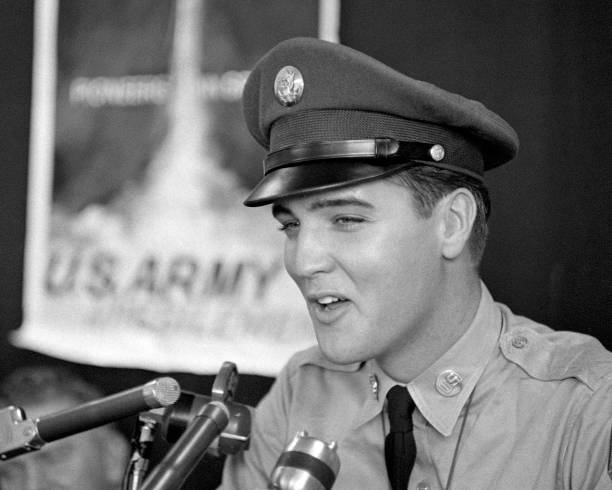 Introduction and Short Summary of the Song
Introduction and Short Summary of the Song
Released in late 1965, “Blue River” is one of Elvis Presley’s lesser-known singles of the 1960s, but it remains a poignant ballad that captures both heartache and reflection. Written by Paul Evans and Fred Tobias, the track features a gentle, flowing melody that mirrors its river imagery, with lyrics about lost love and lingering sorrow. While it did not achieve major chart success in the United States, it performed more strongly in the UK, reaching number 22. Though overshadowed by Presley’s bigger hits of the decade, “Blue River” demonstrates his ability to bring sincerity and depth to understated material.
Origins of the Song
“Blue River” was written by Paul Evans, who had previously written “I Gotta Know” for Presley, and lyricist Fred Tobias. The song was recorded on May 27, 1963, at RCA Studio B in Nashville, during sessions that produced several tracks for potential single or album use. However, the recording was shelved for nearly two years before RCA decided to release it in 1965.
---> Scroll down for the VIDEO
By the mid-1960s, Presley’s focus was heavily on film soundtracks, and many of his studio recordings were held back or released strategically to keep his presence on the charts. “Blue River” was one of these tracks—recorded in the fertile Nashville sessions but issued later when RCA needed fresh Presley singles.
Why Elvis Released “Blue River”
The single was released in December 1965 with “Tell Me Why” as the B-side. At this point, Presley’s chart dominance was beginning to be challenged by new acts of the British Invasion, particularly the Beatles and the Rolling Stones. RCA hoped that “Blue River” could maintain Presley’s momentum on the singles market, even though it was a ballad rather than a high-energy track.
---> Scroll down for the VIDEO
In the U.S., the single only reached number 86 on the Billboard Hot 100, reflecting the increasingly competitive musical landscape. In the UK, however, it fared better, climbing to number 22 and giving Presley another respectable chart entry overseas.
The Message Conveyed in the Song
“Blue River” uses the metaphor of a river to reflect lost love and heartbreak:
“Blue river, it can’t be found,
You keep flowing on through the town.”
The lyrics convey a sense of longing and regret, with the river symbolizing both the passage of time and the persistence of sorrow. The narrator laments that his love is gone, and just as the river continues to flow, so too does his sadness.
Presley’s delivery captures this melancholy with warmth and sincerity. He does not oversing the song but instead conveys quiet pain and resignation, making the lyrics resonate with authenticity.
The Recording and Musical Characteristics
Musically, “Blue River” is a polished pop ballad, reflecting the Nashville sound that defined much of Presley’s early-to-mid-1960s output.
-
Vocals: Presley’s voice is rich and emotive, carrying the sadness of the lyrics without drifting into melodrama.
-
Instrumentation: The arrangement includes piano, gentle guitar, bass, and restrained percussion, with subtle backing vocals to add depth.
-
Mood: Melancholic yet soothing, the song mirrors the steady flow of a river, giving the performance a contemplative quality.
-
Style: The track straddles the line between pop and country, with echoes of traditional balladry that gave it cross-genre appeal.
The production keeps the focus on Presley’s voice, allowing the natural emotion of the performance to dominate.
Cultural and Commercial Impact
While “Blue River” did not achieve blockbuster success, it reflected Presley’s continued relevance in the mid-1960s despite the rise of new musical trends. Its modest U.S. performance was a sign of the challenges Presley faced during this period, as his recording career became increasingly overshadowed by his film commitments.
In the UK and parts of Europe, the song enjoyed stronger reception, helping Presley maintain an international presence. Fans abroad often embraced even his more understated singles, keeping him a chart regular throughout the decade.
Culturally, the song added to Presley’s catalog of ballads about lost love, reinforcing his reputation as not only a rock-and-roll pioneer but also a sensitive interpreter of heartbreak.
Legacy of “Blue River”
Today, “Blue River” is often remembered as one of Presley’s hidden gems from the 1960s—a song that may not have topped the charts but remains valued for its sincerity and emotional resonance. For collectors and longtime fans, it represents the quieter side of Presley’s artistry, when he leaned into balladry rather than bombastic performances.
The track also illustrates the transitional period of Presley’s career. While his soundtrack material dominated much of his recording output, songs like “Blue River” showed that he could still deliver powerful, heartfelt performances when given the right material.
More broadly, the song underscores Presley’s ability to bring humanity to simple lyrics. The metaphor of the river could have seemed cliché in lesser hands, but Presley’s warm, mournful delivery makes it timeless.
More than half a century later, “Blue River” continues to flow quietly within Presley’s catalog—not one of his greatest hits, but a song that reflects his enduring gift for interpreting love, loss, and longing with unmatched sincerity.